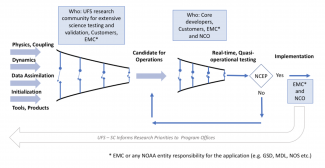The Developmental Testbed Center (DTC), in collaboration with the National Oceanic and Atmospheric Administration (NOAA) and the Unified Forecast System's Verification and Validation Cross-Cutting Team (UFS-V&V), is hosting a three-day workshop to identify key verification and validation metrics for UFS applications. The workshop will be held remotely 22-24 February, 2021. Approximately 275 participants have registered for this event from across the research and operational community.
The goal of this workshop is to identify and prioritize key metrics to apply during the evaluation of UFS research products and guiding their transition from research-to-operations (R2O). Because all UFS evaluation decisions affect a diverse set of users, workshop organizers are encouraging members from government, academic, and private-sector organizations to participate in the workshop. In preparation for the workshop, a series of three pre-workshop surveys were distributed to interested parties. The results of the surveys have been used to prepare the discussion points of the breakout groups to streamline the metrics prioritization process.
The organizing committee is using the outcome of the 2018 DTC Community Unified Forecast System Test Plan and Metrics Workshop and pre-workshop surveys to form the foundation of the workshop. Ricky Rood, Dorothy Koch, Hendrik Tolman along with the Workshop Co-Chairs will be kicking off the meeting by providing the background and goals for the workshop. The first day features an opening plenary to curate the issues to be addressed in the breakout groups. The end of Day One and Day Two includes breakout groups to allow for final community input into the application forecast challenges along with prioritization across all applications. The workshop will end on Day Three with a final set of breakout groups to discuss how to apply the prioritized metrics to the full R2O development stages and gates. A wrap-up plenary rounds out a robust agenda The breakout groups will focus on the nine UFS applications along with key forecast challenges:
Model Applications
- Short Range Weather (SRW)
- Medium Range Weather (MRW
- Sub-Seasonal
- Seasonal
- Atmospheric Quality and Composition
- >Coastal
- Hurricane
- Marine and Cryosphere
- Space Weather
- Land/Hydrology
Additional Key Forecast Challenges
- Aviation
- High Impact Weather (beyond hurricanes)
- Weather Extremes
- Data Assimilation
The Workshop Organizing Committee includes Tara Jensen (NCAR and DTC), Jason Levit (NOAA/EMC), Geoff Manikin (NOAA/EMC), Jason Otkin (UWisc CIMSS), Mike Baldwin (Purdue University), Dave Turner (NOAA/GSL), Deepthi Achuthavarier (NOAA/OSTI), Jack Settelmaier (NOAA/SRHQ), Burkely Gallo (NOAA/SPC), Linden Wolf (NOAA/OSTI), Sarah Lu (SUNY-Albany), Cristiana Stan (GMU), Yan Xue (OSTI), Matt Janiga (NRL), and the entire UFS V&V Team.
